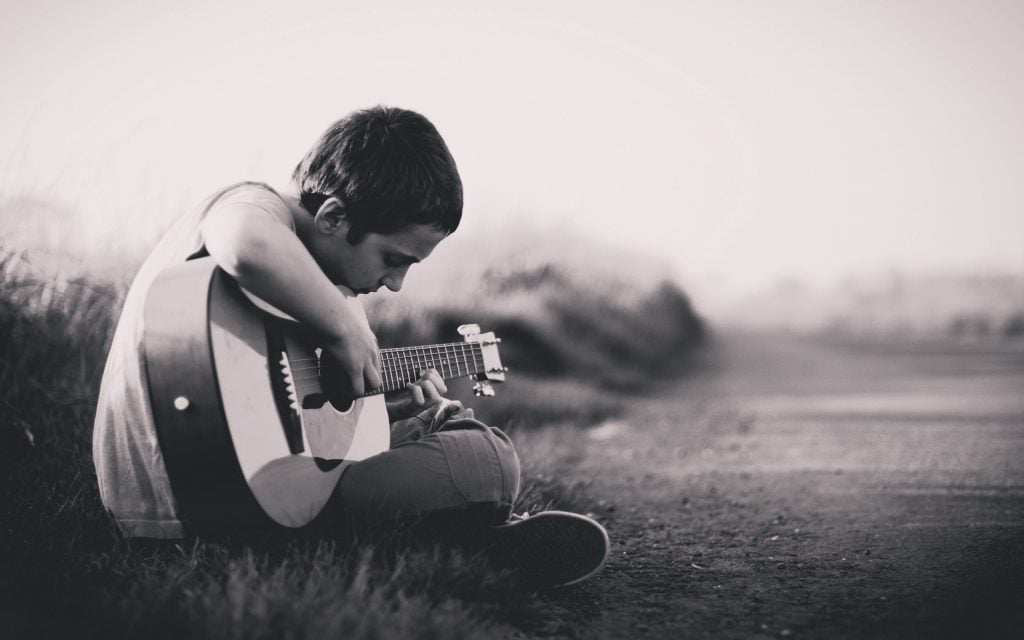A few weeks ago, I was on a Facebook forum for music teachers. Someone posed a question about popular music education—the essence of the post was prodding at the philosophy of music educators and whether or not they view popular music as a valid area of study. And, more importantly, should teachers incorporate other types of teaching/learning into their music curriculum?
I was completely fascinated as I read through the comments. There were many strong opinions in all directions. But, what surprised me the most had nothing to do with popular music education. It had to do with a particular teacher’s philosophy on their role at their school.
Table of Contents
If we are closed off to teaching certain kids, we are missing the point of music education.
His fear was that if he started teaching courses outside of his normal teaching load (concert band), his administrators would start putting kids in classes that didn’t want to be there. Instead of teaching the students that showed up because they wanted to be there, he would be forced to teach students that had to be there, whether they wanted to or not. In his own words, his music classes would become a “dumping ground.”
Landfill Philosophy
In all fairness to the person who posted their hesitations on the Facebook forum, it is hard to read intentions and tone via social media. I’m sure this person had valid concerns and that there are pieces of contextual information that would color his words in new light. However, his sentiment is nothing new. I have heard many teachers refer to their general music classes as “dumping grounds.” They often lament the need to slog through such compulsory classes to get to the more personally fulfilling ensemble classes, full of students with a genuine interest in school music. (Note: I say school music, not music. I think assuming that students not involved in large ensembles are not interested in music is a huge misstep and has been addressed by other researchers.)
I normally do not choose to engage in heated debates on social media. I don’t see much benefit to it. But, with regard to this thread, I couldn’t stay silent. For all students who could benefit from a music classroom set on The Welcome, I knew I must speak up.
“I am a dumping ground teacher. And, I love it.”
When I started my job 12 years ago, I knew I would have to teach all students, not just the best of the best. I didn’t know how challenging it would be to be a middle and high school general music teacher. It is hard! You deal with classroom management issues that don’t seem to present themselves within the large ensemble setting. It takes so much work to forge relationships, get student buy-in, and to convince kids that they do have potential in music. Sometimes I joke that my day feels like it has a split personality. One minute, I’m conducting an orchestra full of kids who barely say a word and are extremely driven to succeed. The next minute, my room is flooded with students who are bouncing off the walls and trying to haphazardly play instruments that I have sitting out, and it takes every bit of my energy to rein them in. It’s beautiful and exhausting.
“I am a dumping ground teacher. And, I love it.”

I didn’t want to be a general music teacher. I think I always imagined that I would bide my time until I got a more elite music education job, one in which I only taught the best of the best. If general music is a landfill, then large ensembles should be considered a recycling center–only selecting specific materials to be sorted, cleaned, and re-imagined. (I do realize the large ensemble classes have their own unique challenges and that every school is different!) Do we believe this? Do you believe this? It took about three years for me to realize that I wanted to be (as the person called it) “a dumping ground teacher.” Why? Why would I choose to teach all students over having a schedule full of students who wanted to be there?
At my core, I believe that all kids can be reached and that they should be reached. I believe that all kids have potential to both consume and create music. And, I believe that my classroom may be one of the few places where the really hard kids will hear someone say that they have value and can do amazing things. There are plenty of students who don’t want to take math classes. But, our schools “force” them to take math anyway. Why? Because we believe that things like math and science are of benefit to everyone. When we take a “dumping ground” mentality, I’m afraid we’re saying that music education isn’t a benefit to everyone. But—just like math, chemistry, and history—it is. I wouldn’t be surprised if we were to all agree that a “good” math teacher could be defined as one that “gets kids who think they aren’t good at math to become excited about math.” Why is music different?
The Dumping Ground Kids
If I hand selected my students over the past years, I would have missed out.
I would have never watched Isabel stand up in front of the room and perform a song about being an immigrant and feeling oppression in her home country. I would have never watched others cry as she shared her story, and would have never been able to send Isabel a stack of feedback forms from other students, affirming that she was both brave and musically gifted. I would have never been able to say to her, “you matter.”
I would have never seen Kyle perform for the first time. Kyle. The student who came into my class on the first day and shouted “Why do I even need to take this class?!” Crossed arms, angry faced Kyle. This is the same Kyle who didn’t want to play an instrument and was encouraged to sing by his project group. This is also the same Kyle who received such positive praise that he decided to sing for our final show. His senior year (after joining the choir and performing in every school-wide event), Kyle was known as “the kid with the amazing voice.” That was Kyle. I would have also missed out on the email he sent me years later in college, thanking me for providing a space where he could find his voice and in turn, his identity.
I’m so glad that I was forced to see that general music is not second best and that teaching all kids is a privilege and an honor

I would have never have sat with Brendan every day of his senior year, helping him shape a song that we would record at a studio for our capstone project in guitar class. Brendan–a kid who nearly didn’t graduate, a kid who came late to school most days. Still, Brendan had a song that kept him coming to class day after day. It kept him picking up a guitar and working nonstop. And, I would have never seen the look on other teacher’s faces when I shared his song. “Brendan wrote that?!! I didn’t know he was a musician!” Exactly. Brendan didn’t know he was a musician either.
These three stories just scratch the surface of the students I have had the privilege of teaching in my 12 years as a music educator. It’s hard work to take a crossed arms/headphones-in/blank-staring student and try to pull out their musical capacities and move them to do the work you know they can do. It’s hard when classrooms feel out of control and personalities collide. And, it’s hard when others in your building see your class as a dumping ground.
I’m so glad that the job I got out of school wasn’t my dream job. I’m so glad that I was forced to see that general music is not second best and that teaching all kids is a privilege and an honor, not a sentence or a stepping stone to get to the “good” kids.
Our Language Matters
Our rooms are no more landfills than our students are trash. We need to change the way we speak about our programs, our classes, and our kids. A human being worthy of studying music? Yes. Dumping ground student? No.
The scariest thing in our music classrooms? Our mindset.
If we are closed off to teaching certain kids, we are missing the point of music education.
*to find out more about “The Welcome”, check out Lee Higgins’ work on Community Music and his book, Free to be Musical (co-authored with Patricia Shehan Campbell)
*student names have been changed in this piece to protect privacy




This made me tear up! Eye-opening!
Thanks, Wini! I get choked up when I think about some of my students, too. I need to keep their stories with me when the days feel long.
Perfectly said. There is nothing more rewarding than reaching those kids who don’t believe in themselves or don’t have others who believe in them. I may not be able to completely change their minds about general music, but they know they have worth when they leave my class.
Thanks for sharing, Amanda! It is crazy how much we prepare to teach our subject and in the end it can all be boiled down to reaching kids. I need this reminder every day.